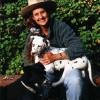More than fifty scholars, writers and special guests attended the Grateful Dead sessions of the recent Southwest Popular/American Culture Association conference. Held in Albuquerque, NM, the conference drew more than 1,000 academics, with the Dead Area — nicknamed the Grateful Dead Scholars Caucus — as the single largest group. In addition to forty papers and presentations on everything from the nature of Deadhead identity to how “Dark Star” works on a musicological level, the Caucus also welcomed special guests Rosie McGee and Rhoney Stanley, both longtime band family members and recent authors who discussed their time with the band, beginning in the sixties. Evening events included a hootenanny and a fine house concert by David Gans.
Last month was the 17th annual Grateful Dead Scholars Caucus. What exactly happens at this event? What role do you play?
The Caucus is an area of the SWPCA, a big international conference devoted to studying popular culture in all of its myriad aspects. Our area is somewhat unique in that it has developed a strong personality over its seventeen years, and has a core of fine scholars who attend every year. Like most conferences, we spend our days giving papers and making presentations on every conceivable aspect of the Grateful Dead, from their music and business practices to how they fit into larger contexts, from philosophy to cultural studies.
What does day-to-day attendance include?
We start pretty early in the morning and often go until late in the evening — although the conversational setting shifts from formal to informal as the evening wears on. A few years back, one participant came up with our informal slogan, “Think all day and rock all night,” which is pretty accurate.
This year was the largest gathering to date with over forty-one papers and presentations and four round table discussions. Any stand-outs?
Everyone seemed to feel like this year was one of our best, if not our best ever, so singling out individual papers is difficult. We had wonderful presentations from first-time attendees Rhoney Stanley and Rosie McGee, though, and those were definitely highlights.
You compile a book for attendees which is divided into sections entitled Reading, Writing, and Critiquing the Dead. Are these the main themes of the caucus or how do these approaches work within the framework of the caucus?
Those were good divisions for the book and they definitely convey the flavor of what we do — after all, that’s what all scholars tend to do: read, write, critique, and perhaps most of all, talk …
Can anyone submit their work of the caucus? How can one participate not only as fan but as a presenter?
We make it a point to include as wide a range of perspectives as possible. To date, we’ve welcomed almost 150 scholars from more than 26 fields and disciplines, and there is room for all levels and ranges of ability, from undergraduate to senior professor to interested outsider. This year we had a couple of folks who flew out for the conference and stayed the entire time, just because they were curious — and best of all, we had one presentation this year from someone who had been a spectator for four years and decided to make a presentation this year, which was wonderful. So we definitely have that Deadhead sense of inclusiveness, although we also foster a sense of excellence and rigor as well. People work hard on their presentations, just as we did in the shows and in the parking lots.



